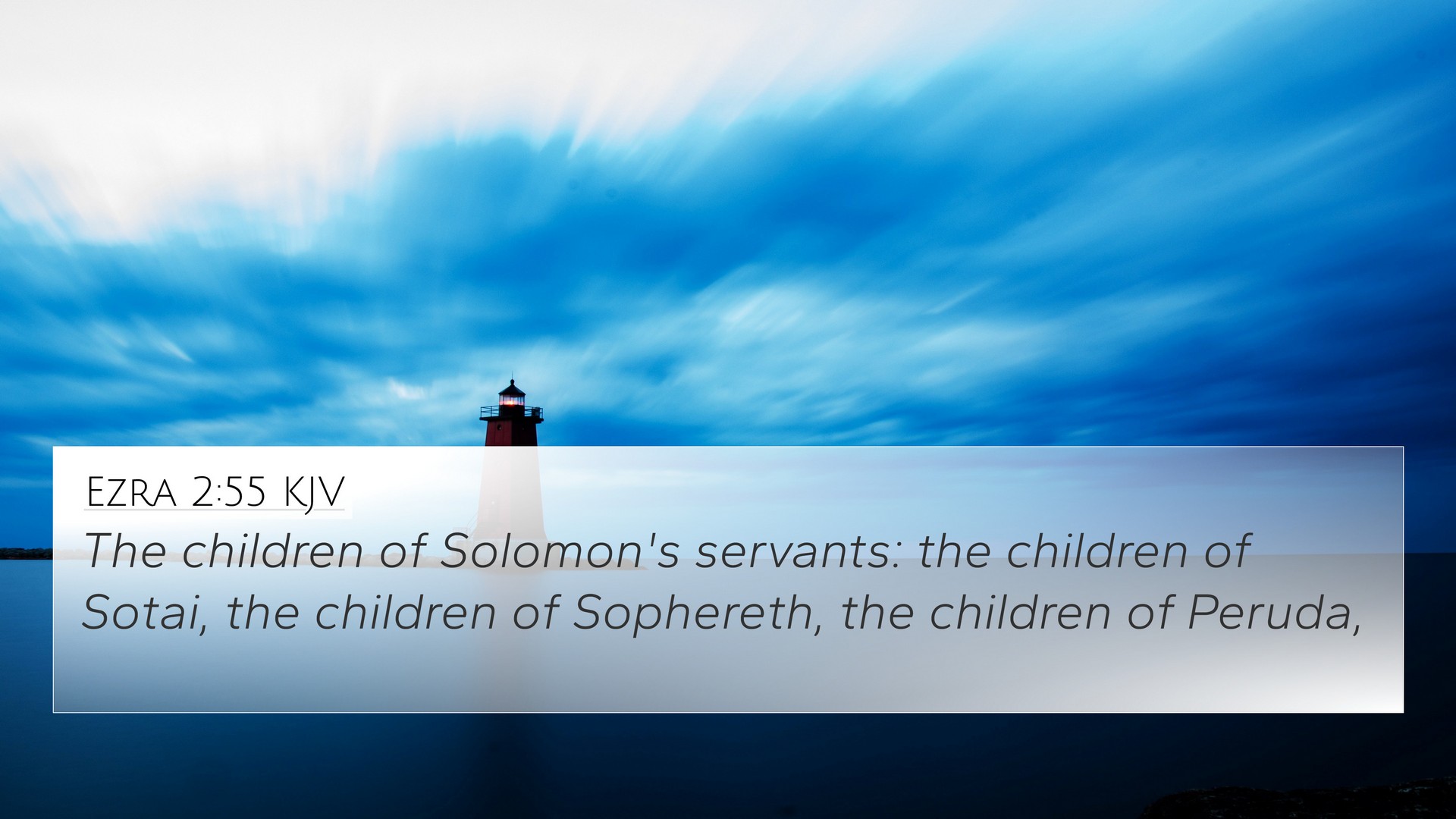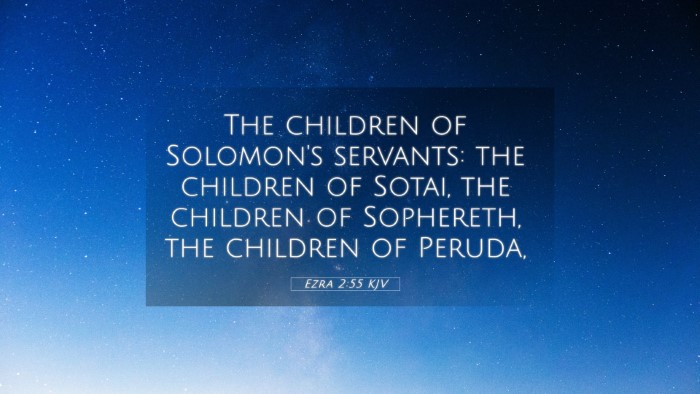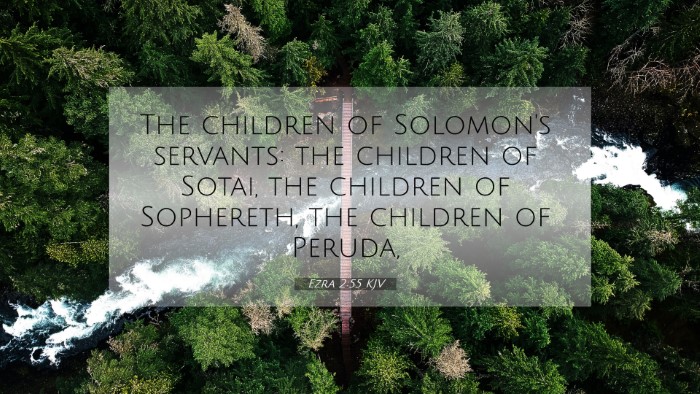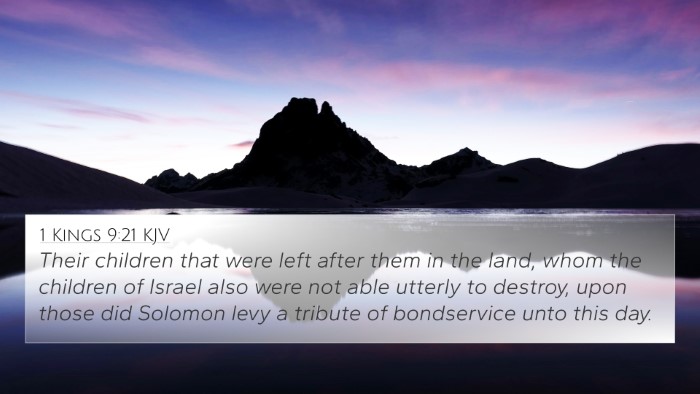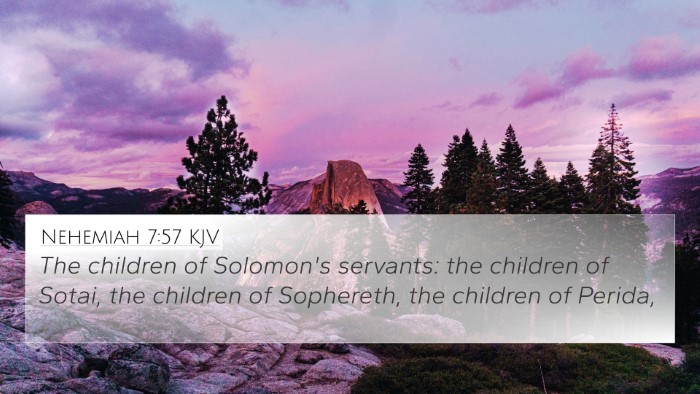Understanding Ezra 2:55
Ezra 2:55 states: "The children of Solomon’s servants were three hundred ninety and two." This verse lists those who returned to Jerusalem from Babylonian captivity. Specifically, it mentions the children of Solomon's servants, who played a role in the rebuilding of the temple and the restoration of the community.
Contextual Analysis
The context of Ezra 2 is pivotal as it documents the return of exiles to Jerusalem after their Babylonian captivity. This chapter provides details about the groups that returned, including priests, Levites, and notable families, demonstrating God’s faithfulness in restoring His people.
Commentary Insights
- Matthew Henry: Henry emphasizes the significance of the returning servants, noting their role as descendants of those who served in the temple during Solomon's reign. He reflects that their presence signals continuity and the restoration of worship.
- Albert Barnes: Barnes sees this verse as part of a broader historical account intended to provide a complete picture of those involved in the return. He notes the importance of recording such genealogies for establishing the legitimacy of those returning.
- Adam Clarke: Clarke provides an observation regarding the lineage of those mentioned, suggesting that these connections were crucial for re-establishing proper worship and service in the temple, thereby linking this return to God's covenant promises.
Theme of Restoration
The overarching theme in Ezra 2:55 is restoration. The return of Solomon's servants highlights the fulfillment of God's promise to restore Israel and enable the worship of Yahweh. This verse connects deeply with the concept of God’s faithfulness to His covenants.
Bible Verse Cross-References
Several Biblical texts support and enrich the understanding of Ezra 2:55:
- 1 Kings 8:65-66: Discusses the dedication of Solomon's temple, providing context for the significance of Solomon’s servants.
- Ezra 1:3: The proclamation by Cyrus allowing the Israelites to return and rebuild the temple. This highlights God's sovereign plan for restoration.
- Neh. 7:57: A parallel account regarding those who returned, emphasizing the continuity of God’s people.
- Zech. 8:7-8: A prophecy of restoration, complementing the narrative of the returned exiles.
- Jer. 29:10-14: God’s promise of restoration after seventy years in Babylon, providing further context for this return.
- Ezra 2:1: An introductory verse about the return of the exiles, linking to the genealogical records that follow.
- Isaiah 44:28: God’s declaration regarding Cyrus as a shepherd who would fulfill God’s purpose, echoing the themes of restoration found in Ezra.
- Matthew 1:12: A genealogy that links Jesus to the line returning from Babylon, tying the Old Testament promise to New Testament fulfillment.
- Acts 15:16: Quoting Amos, indicating that God is restoring His people, resonating with the restoration theme throughout the Scriptures.
Thematic Bible Verse Connections
The connections to other Bible verses create a deeper understanding:
- Restoration: Links to Joel 2:25, where God promises to restore the years the locusts have eaten.
- Lineage and Identity: Referencing Romans 8:16-17 supports the idea of being adopted into the family of God, similar to the returning exiles.
- Divine Sovereignty: Proverbs 21:1 illustrates how the king's heart is in the hand of the Lord, which underlines God’s control in the return of the exiles.
- Promises of God: Hebrews 10:23 calls believers to hold unswervingly to the hope we profess, reflecting the faith of those returning.
- The Role of Servants: Echoes John 12:26 where Jesus states that if anyone serves Him, the Father will honor them, linking to the servants’ legacy.
Conclusion
In conclusion, Ezra 2:55 serves as a profound reminder of God's faithfulness and the restoration of His people. Through careful cross-referencing and thematic connections, one can see how this verse intertwines with the grand narrative of Scripture, enhancing our understanding of God's redemptive plan.
